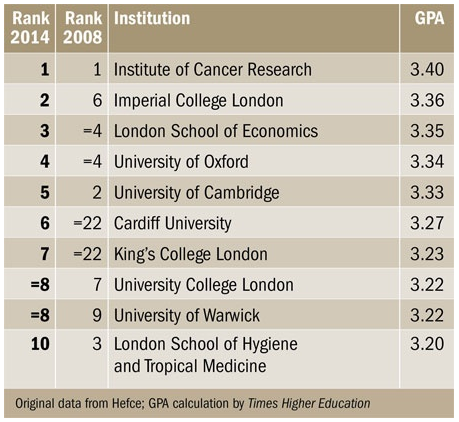
The Institute of Cancer Research, London, is the top higher education institution in the country in the overall league table of academic performance, the Government’s Research Excellence Framework has revealed.
The Times Higher Education league table – viewed as the definitive ranking of universities – places The Institute of Cancer Research (ICR) first in the UK overall, taking into account research excellence and impact.
The ICR ranked first in the UK for the impact its research has on society, in a powerful endorsement of its track record as the most successful university in the world at discovering new treatments for people with cancer, and of its partnership with The Royal Marsden NHS Foundation Trust to develop them for patients.
The ICR was also joint top with the London School of Economics for ‘research outputs’, measuring the quality of published research studies. And it ranked first for biological sciences, coming top by some margin in an assessment of the academic quality of its biological sciences research.
The Research Excellence Framework, or REF, assesses all 155 accredited academic institutions in the UK and is the biggest, most detailed, evaluation of research quality in the world. It was last carried out in 2008.
The ICR topped the overall ranking last time too but this time did even better – with its score, known as the grade point average, jumping from 3.15 to 3.40.
The top ranking demonstrates the ICR’s commitment to the highest standards of academic excellence in understanding the genetics and molecular mechanisms of cancer, and its drive to translate its discoveries into clinical advances with real benefits for patients.
The ICR’s submission included a succession of world-class research studies, for work on the genes and basic mechanisms of cancer, our understanding of cancer evolution, and the discovery and development of new treatments.
The submission also included case studies demonstrating the major impact the ICR’s work has had on patients, including the progression of new drugs such as abiraterone into the clinic and the widespread adoption of targeted radiotherapy.
Professor Paul Workman, Chief Executive of The Institute of Cancer Research, London, said: “I am absolutely delighted that this definitive evaluation has recognised the world-leading quality of our research, and the huge benefits it is having for people with cancer. The figures vividly demonstrate the success of our model of research, which combines the finest minds in cancer research with a relentless focus on turning our discoveries into new treatments.
“Over the six-year assessment period, we have discovered new drugs, cancer genes and radiotherapy techniques, and seen our earlier research delivering real benefits for patients in the clinic. I am immensely grateful to our researchers, clinical partners and all our academic staff for working so hard to deliver today’s result.”
The ICR is a College of the University of London and submitted work in two units of assessment for the REF – biological sciences for fundamental research into the biological basis and behaviour of cancer, and clinical medicine for translational and clinical research conducted through close collaboration with partner hospital, The Royal Marsden.
As well as coming first for biological sciences, the ICR ranked joint fourth among all universities in clinical medicine, behind only Oxford, Cambridge and King’s College London, and alongside Imperial College London.
In biological sciences, some 96% of the ICR’s academic research was assessed to be world leading or internationally excellent in terms of originality, significance and rigour (4* or 3*);
In clinical medicine, 83% of the ICR’s research was assessed to be world leading or internationally excellent in terms of originality, significance and rigour (4* or 3*);
In addition, 100% of the ICR’s research in both units of assessment was judged as having had very considerable or outstanding impact in terms of its reach and significance.
The REF was managed by a team based at the Higher Education Funding Council for England and conducted by the UK’s four main higher education funding bodies. The format of the REF differs from the RAE with the introduction of a new element focusing on the impact of research in terms of demonstrable benefits to the economy, society, public policy, culture and quality of life. In addition, there are fewer, larger units of assessment.